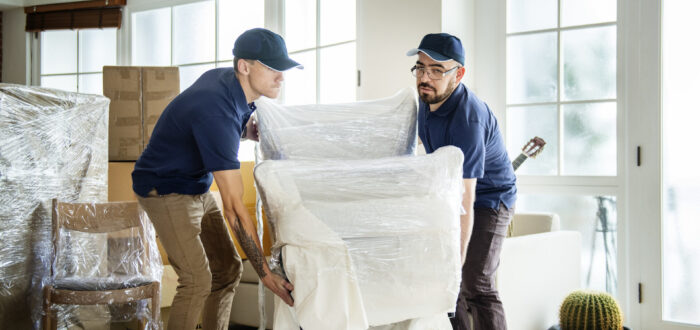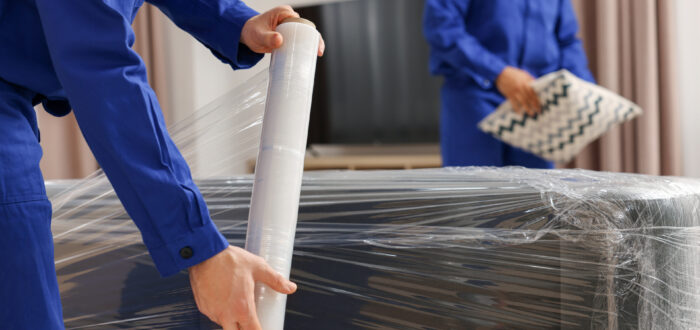

This Checklist Will Make Moving to a New Home a Breeze
Posted in Moving Essentials,Planning the Move on June 15, 2021
There are numerous things you need to do before moving to a new home in order to have a lucky new beginning, as Feng Shui rules say. According to these rules, you should buy your house a gift and leave your old broom behind so that bad luck doesn’t follow. But even if you are not superstitious, you still have to do a lot of things before relocating to your future residence.
Moving across the country is believed to be one of the most stressful moments in a person’s life, so it is no wonder there are so many superstitions and beliefs regarding relocating to another home. And some suggestions are actually pretty useful and good, like placing flowers in the house and playing some music on your relocation day. And while this will lift your spirits and mood, you will still have a lot on your hands, and our list can help you greatly in this matter.
Moving to a New Home – Long-Distance Moving Preparations
Before we start about things you need to do when you set foot in your next place, you should first organize your move. With good planning and organizing, you will move efficiently and, most importantly, stress-free. The first thing you should do is create a relocation budget. When making your financial plan, include all expenditures you may have before and after your move.
One of the best relocation hacks is to create your relocation binder, and here you should put all important documents, plans, and arrangements regarding your relocation process. Here are some of the stuff you should put in your binder:
- Budget,
- Real estate agent info,
- Cross-country movers information and documentation,
- House papers,
- Preparing your home for sale strategy,
- Packing and unpacking strategy,
- Who to notify when relocating list.
Book Your Long-Distance Movers to Get Ready for Cross-Country Moving
Once you made your plan, it is time to find and book cross-country moving services. When looking for movers, there are some red flags you should be aware of to avoid relocating scams. For example, if they avoid answering your questions, they are probably a fraud. When looking for long-distance movers, check if they have a USDOT number because every company is obliged to have this according to federal laws.
Also, when hiring movers, make sure you ask them if they provide car shipping services. Your life and relocation will be much easier if you can book all the services at one company. And since you are relocating your entire life to another state. It could be convenient if they have storage facilities as well. There you could store your stuff and have more time for other arrangements and maybe even some renovations.
Buy Some Packing Materials for Moving and Pack Everything
One of the things on your moving to-do list is buying some packing materials. You will need packing paper, bubble and plastic wrap for your fragile items, protective blankets, duct tape, and of course, boxes. After this, you can start with packing. Go room by room and decide what to keep and what to give away. The goal is to first pack items you don’t use. For example, if you are relocating in winter, pack your summer clothes first. And if you have to move a piano or don’t know how to pack glasses, don’t hesitate to hire movers for packing service.
After all, you are relocating your entire life, and you will need all the help you can get. And don’t forget to pack a bag of essentials. Here you should put everything you will need for a couple of days after setting foot in your residence.
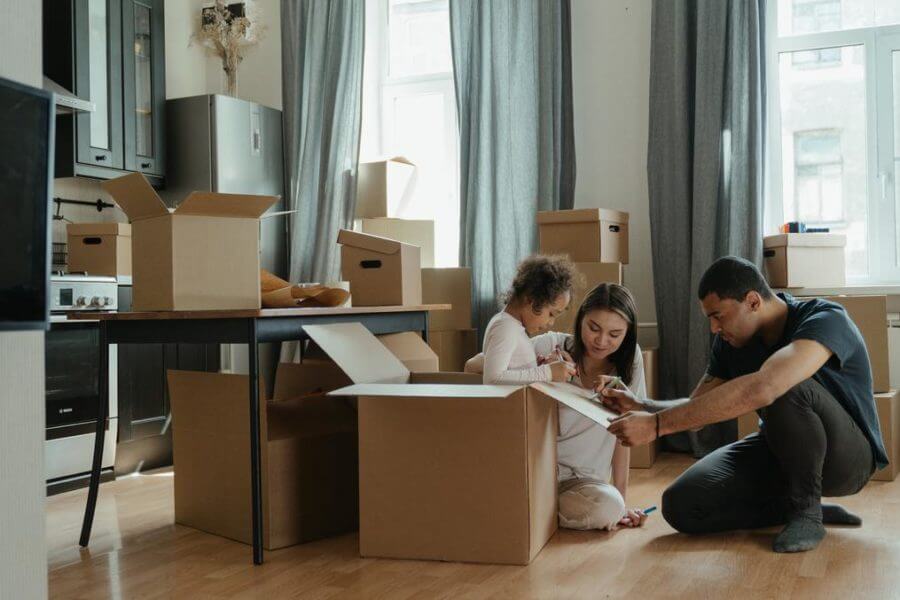
Gather Your Important Documents
Part of your relocation essentials should be all your important documents. You should have all the documents in one place and with you during relocation. Buy or make a binder and put all important documents inside. Here are documents you should put there:
- Personal files,
- Medical and school records,
- Mortgage papers,
- Bank papers,
- House papers,
- Passports.
Check out this video for more tips on organizing important documents.
What to Do When Moving Into a New Home – Things to Consider After You Move In
So, what is the first thing to do when moving into a new house? Suppose you already canceled or transferred your utilities. Now it’s time to check if everything is working properly. Locate your fuse box and water valve and turn everything on. Go to your sink and turn the water on to see if the plumbing is in order, and plug in all your appliances to check the electricity. And then, you can start with the inspection of the residence.
Check Your Home
Now that your residence is semi-empty (it is filled with boxes, alright,) it’s the best time to inspect everything and look for any problems you didn’t notice when buying it. Go to each room, check the walls for moisture and mold, and see if there are any traces of pests. Take a picture of every room so if necessary you can file a complaint. It would be good to call pest control to spray your house even if you don’t see anything, just in case.
One of The Crucial Things to Do When Moving Into a New Home – Deep Clean the Whole House
One of the things to do when moving into a new home is to deep-clean everything. If there is a carpet, book a cleaning agency as soon as possible, because these agencies have machines that can clean everything in one day. One of the benefits of relocating is the fact that you can clean everything from top to bottom and know that your place is spotless. So roll up your sleeves and start cleaning. From cabinets to bathroom floors, double-check as you go through everything. It will be exhausting, but you can spread this out in a couple of days. Just don’t get lazy and start putting stuff in their place before you clean it all.
Make a Plan of What Goes Where
While cleaning everything, start making plans about where you will put what. What is the best place for your sofa? Where should you place your pots and pans? Every detail is important, and now is the time to figure out how to organize stuff and what to buy when moving into a new home. You might even get inspired and get some creative storage ideas you can implement. Just don’t make common relocation mistakes people make, and don’t rush things up because you are tired.
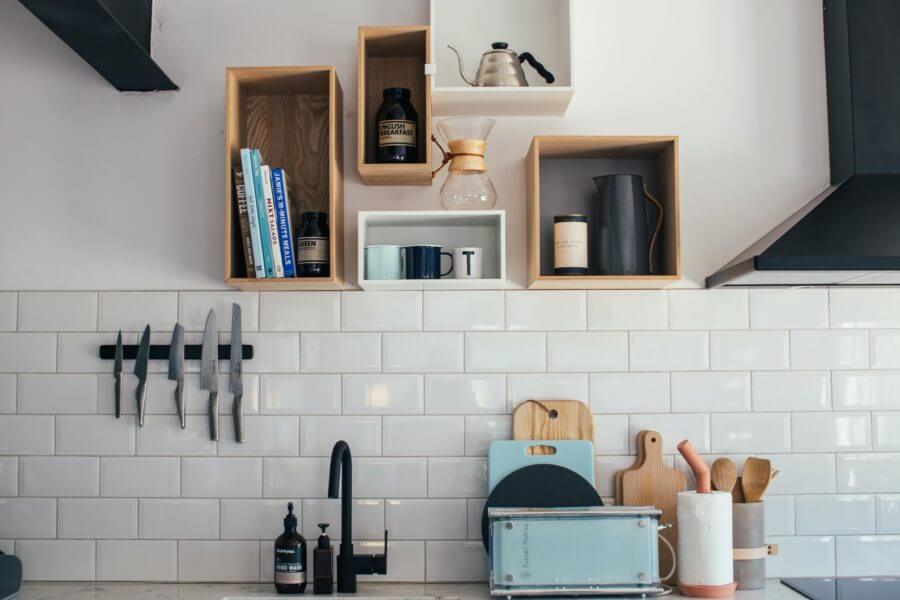
Make a List of Things You Need to Change and What to Buy When Moving Into a New Home
And while you are inspecting your place, this will be a good opportunity to make a list of stuff you want to improve, or if there is some problem to fix. If you need to change something or paint some rooms, do this before you start unpacking. There will be a lot of dust and dirt, so you better keep your stuff in boxes until everything is over. But if you have to renovate your entire place, go room by room. For example, prepare your bedroom first. This way, you will be able to put some of your stuff away and then renovate the rest of your place.
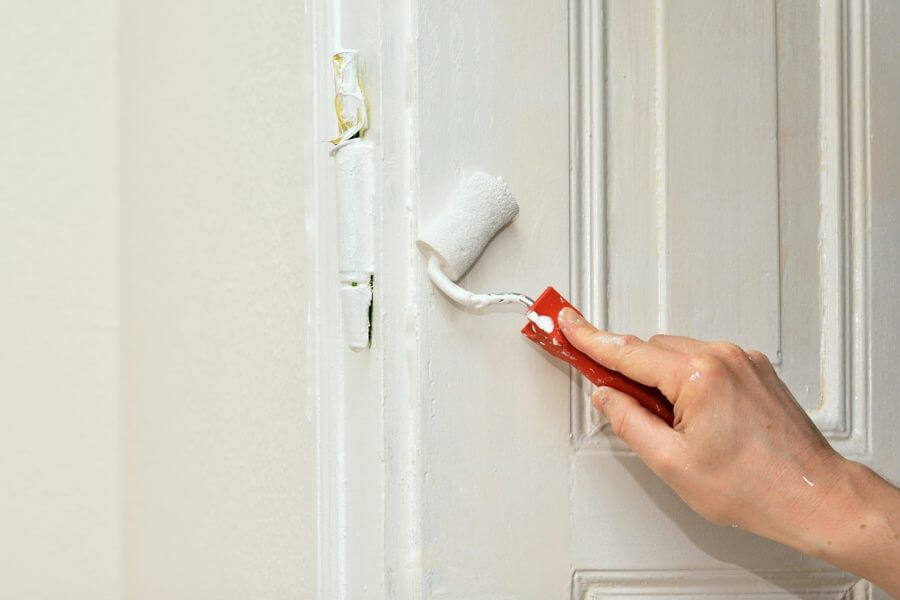
Don’t Forget to Secure Your House
One of the things to do after relocating is to secure your residence. First, change your locks. You never know who previous tenants were and who might have a key. So it would be good if you do this on the first day of your move-in. If you haven’t already installed some sort of security system and alarms, it is time to get some. On the other hand, if you have an alarm, call your company to change the password. You should check all your smoke detectors if they have batteries. If you are relocating with kids, and especially with toddlers, you should baby-proof everything too.
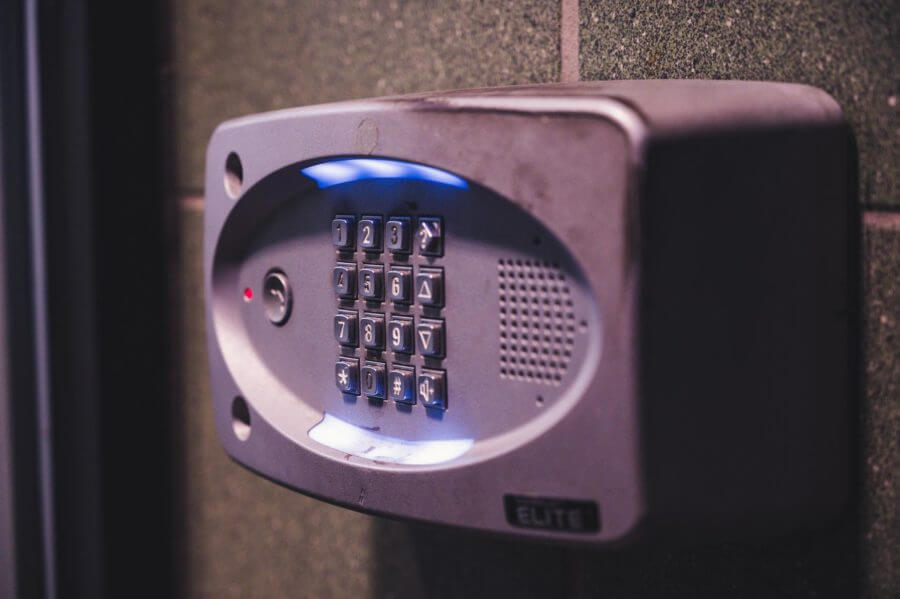
Update Your Address
You can change your address after you settle or before you relocate. Either way, this procedure is so simple and doesn’t take so much effort. Just go on the Post Office website, fill out the change of address form and your mail will be forwarded to your address for the next 12 months. That’s plenty of time to inform everybody about your address change. Now, with all the help of modern technology, you can easily inform all your friends and family with a circular email, and most utility companies have an online option for a change of address. Also, don’t forget to change the name on your mailbox as well.
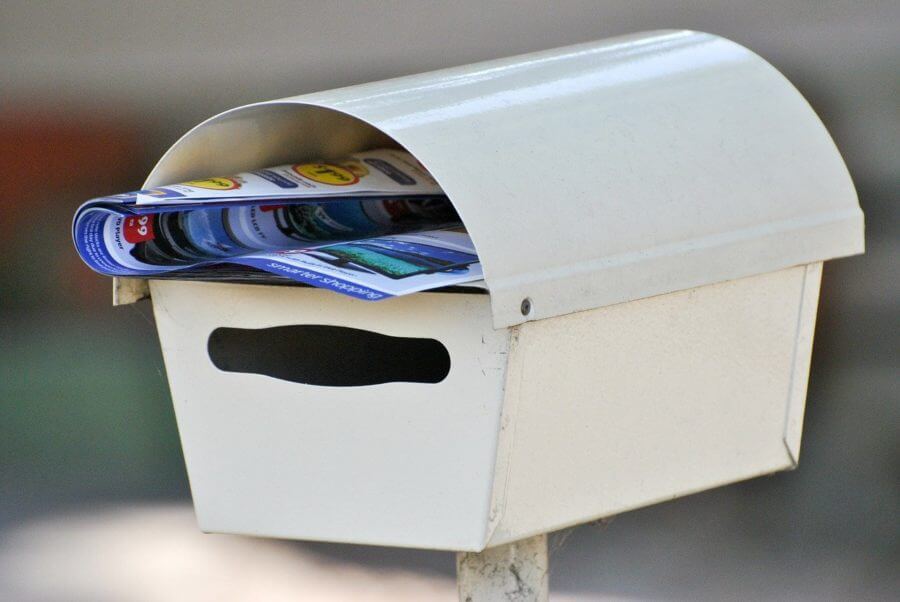
Last But Not Least – Make Unpacking Party
Moving cross country can be difficult and challenging, especially if you are relocating to another state alone. If you are lucky and relocating to a place where you have friends and family, you should organize a party to celebrate your relocation. And while you are celebrating, why not include unpacking too? Call your friends to a fun working party. You already know where you wish to put your items, so unpacking should be that big a deal. And with more hands to help you, this can easily be done in one day.
On the other hand, if you just have to make some friends in a new city and are not in a partying mood, you can do this alone. If you packed your stuff properly and labeled each box, this should be a drag. First, place each box in the corresponding room and start with your unpacking. If you don’t have space in your closet, put only the clothes you will use right away. And if you have a garage, excellent! A lot of items you don’t need immediately, like Christmas ornaments, can be stored there.

What Is the Luckiest Day to Move Into a New House?
Even if it is one of the most challenging and stressful moments in your life, it will probably be one of the happiest days too. There are some disputes about the luckiest day for move-in. Some say it shouldn’t be a rainy day, which is good advice. Others say that you should check all your household members’ zodiac signs and calculate the best date for relocating. This is actually a Feng Shui calculator based on the Chinese Zodiac. Some people say that Friday is best, while others contradict that by saying it is a Thursday. But no matter which dates you choose from, if you relocate with professional cross-country movers, every day will be a lucky day. Honestly, can it be any different when they do everything for you?
If you are ready to relocate, keep in mind that it would be less stressful with professionals by your side. You’ve come to the right place because our cross-country moving team can make your relocation process smooth and effortless.
FAQ
What Are the Key Steps to Prepare for a Move to a New Home?
The key steps to prepare for a move to a new home include: creating a moving timeline, decluttering and downsizing belongings, researching and selecting a moving company, obtaining necessary packing supplies, creating an inventory of belongings, updating personal and financial information, scheduling utilities to be shut off and turned on at both old and new homes, and making arrangements for transportation of larger items such as furniture.
What Items Should I Prioritize When Packing for a Move?
When packing for a move, it is important to prioritize essential items for the new home such as medication, toiletries, and a change of clothing, as well as items needed for the first night in the new home such as bed linens, towels, and kitchen supplies. It’s also a good idea to pack a separate box of items that are important or needed right away, such as important documents, chargers, and electronics.
How Can I Stay Organized While Moving to a New Home?
Staying organized during a move involves having a clear plan and system for packing, labeling, and keeping track of belongings. This can be achieved by creating a detailed inventory of items, using colored labels to identify boxes by room, and designating a specific place for all packed boxes. Additionally, using packing methods such as packing items by category or using smaller boxes for heavy items can make the move easier and more efficient. Having a designated area for unpacking and setting up each room in the new home can also help maintain organization and reduce stress during the transition.
How Should I Choose a Reputable Moving Company?
Choosing a reputable moving company requires research and due diligence. Start by obtaining recommendations from friends, family, and real estate agents. Verify their licensing and insurance coverage through the Federal Motor Carrier Safety Administration website. Read online reviews and check the company’s rating with the Better Business Bureau. Obtain and compare quotes from multiple companies, and ask for references from past customers. Schedule in-home assessments to get an accurate estimate and ask about their process for handling and transporting your belongings.
How Can I Minimize the Stress of Moving to a New Home?
Minimizing the stress of moving to a new home involves planning and preparation, delegating tasks, and taking care of oneself. Some tips include: creating a moving timeline, enlisting the help of friends and family, packing and labeling items efficiently, allowing for extra time to adjust to the new home, staying physically and emotionally healthy, and seeking support from friends and loved ones. It’s also helpful to have a clear idea of what to expect and to be open to changes and challenges during the moving process. Remember to take breaks, prioritize self-care, and celebrate small wins along the way.
What Should I Do to Prepare My Old Home for the Move Out?
Take the following steps: complete a thorough cleaning, make any necessary repairs, touch up the paint where necessary, remove all personal items and belongings, disconnect and return rented equipment such as cable boxes and appliances, have the utilities disconnected and leave them in a safe and operational state, and provide the new residents or property manager with your contact information. It’s also important to leave a walk-through checklist for the new residents or property managers to document the condition of the home.
How Can I Ensure a Smooth Transition to My New Home?
Some tips include: creating a detailed moving timeline, delegating tasks, staying organized, packing and labeling items efficiently, researching and choosing a reputable moving company, having a plan for utilities and services to be turned on, making arrangements for transportation of larger items, updating personal and financial information, and taking time to unpack and set up each room. It’s also important to be flexible and open to changes, as unexpected issues may arise.
What Are Some Tips for Unpacking and Settling Into a New Home?
You should unpack one room at a time, so start with essential items and work your way to less pressing items. Also, properly dispose of any packing materials, set up basic functional areas such as the kitchen and bedrooms first, hang up clothes, and put away personal items as soon as possible. Additionally, create a designated area for items that need to be sorted or stored, and use organizing tools such as shelves, drawers, and boxes.
How Can I Make My New Home Feel Like Mine?
Making your new home feel like yours can be achieved by personalizing it with decor, adding your own furniture and belongings, and incorporating your unique style and taste. Some tips include: adding family photos, artwork, and personal items, displaying sentimental items, creating a color scheme and decorating with your favorite colors and patterns, creating functional and cozy spaces that reflect your lifestyle, incorporating plants and greenery, and lighting the space with lamps and overhead lighting that you like.
What Should I Do to Get To Know My New Neighborhood and Community?
Getting to know your new neighborhood and community can take time and effort, but these tips can help: take walks around the neighborhood, meet your neighbors and introduce yourself, and attend local events. Also, you can join community groups or clubs, get involved in local activities, volunteer for a cause, visit local shops and restaurants, and research community resources such as libraries, parks, and recreational facilities. Additionally, consider reaching out to community groups on social media, such as neighborhood Facebook groups or Nextdoor.
